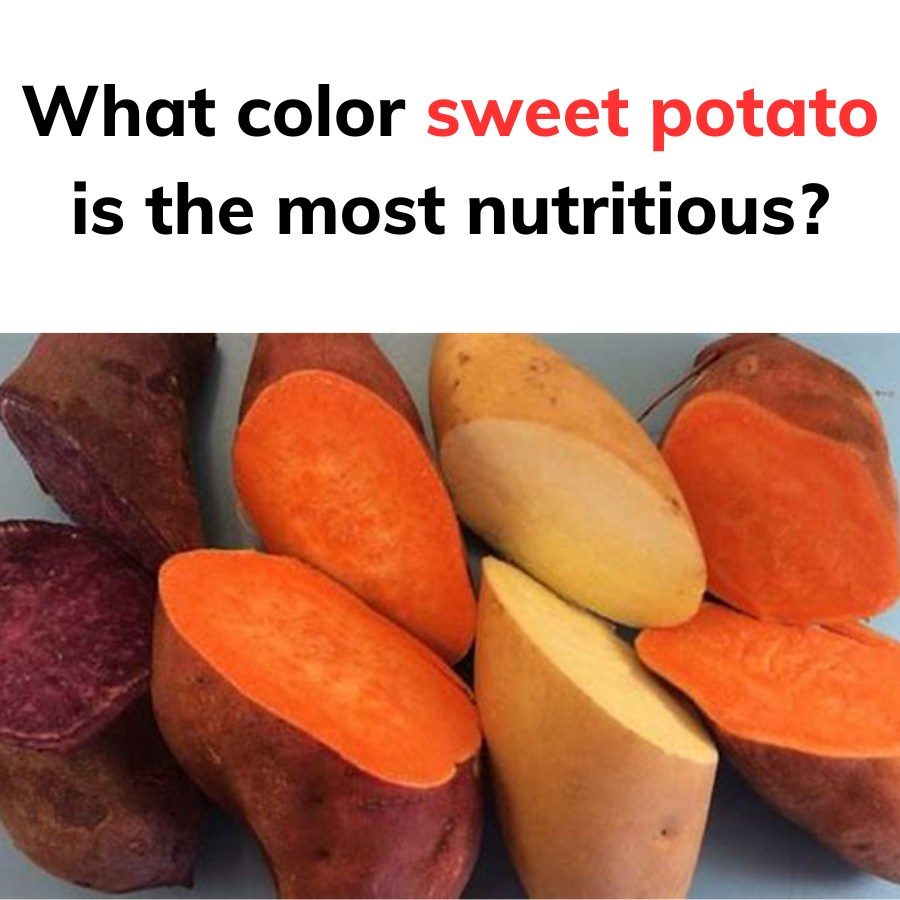Sweet potatoes are not just a kitchen staple—they’re a nutrient-packed superfood that fuels your body and boosts overall health. Whether you bake them, mash them, or roast them to crispy perfection, sweet potatoes are versatile, flavorful, and loaded with benefits. From their rich vitamin content to their impressive antioxidant properties, sweet potatoes are the perfect addition to a healthy diet. Let’s explore why sweet potatoes deserve a spot on your plate, the nutritional differences between their colorful varieties, and how to store them properly to keep them fresh and nutritious.
The Nutritional Powerhouse of Sweet Potatoes

Sweet potatoes are a rich source of complex carbohydrates, offering your body steady energy throughout the day. They are also low in calories and cholesterol-free, making them an excellent choice for weight management and heart health.
- Rich in Nutrients: A medium-sized sweet potato contains approximately 103 calories, 23.6 grams of carbohydrates, and is virtually fat-free. In addition, they are an excellent source of essential vitamins and minerals, including:
- Vitamin A: Vital for eye health, immune support, and cell regeneration.
- Vitamin C: Boosts immunity, supports collagen production, and promotes glowing skin.
- Vitamin B6: Aids in brain development and reduces the risk of cardiovascular disease.
- Potassium: Helps regulate blood pressure and improve muscle function.
- Magnesium: Supports mental health, reduces anxiety, and aids muscle relaxation.
Sweet potatoes are also packed with dietary fiber, which aids digestion, promotes gut health, and helps maintain healthy blood sugar levels. This makes them an excellent choice for those managing diabetes or looking to improve their overall digestive health.
The Nutritional Impact of Sweet Potato Colors
Not all sweet potatoes are created equal. Their color not only affects their taste and texture but also their nutritional benefits. Let’s break down the unique properties of different varieties:
Orange Sweet Potatoes
- Nutritional Highlight: Orange-fleshed sweet potatoes are rich in beta-carotene, a powerful antioxidant that gives them their vibrant hue. Just one medium orange sweet potato provides over 730% of your daily vitamin A needs.
- Health Benefits: Beta-carotene supports eye health, enhances immune function, and protects against chronic diseases. It’s also known for promoting healthy skin and reducing inflammation.
Purple Sweet Potatoes
- Nutritional Highlight: Purple varieties are loaded with anthocyanins, natural plant pigments with exceptional antioxidant properties.
- Health Benefits: Anthocyanins fight oxidative stress, reduce inflammation, and may lower the risk of heart disease and cancer. They also play a role in preventing cognitive decline and improving brain function.
White Sweet Potatoes
- Nutritional Highlight: While less nutrient-dense than their orange and purple counterparts, white sweet potatoes are still a good source of fiber and energy.
- Health Benefits: They provide essential vitamins and minerals while offering a milder, less sweet flavor. This makes them a versatile option for savory dishes.
The Antioxidant Benefits of Sweet Potatoes
Antioxidants are a critical component of what makes sweet potatoes such a healthy choice. They combat free radicals, reducing oxidative stress and inflammation, which are linked to chronic conditions like heart disease, diabetes, and cancer.
- Carotenoids: Found in orange sweet potatoes, carotenoids like beta-carotene protect your cells, enhance your immune system, and support healthy vision.
- Anthocyanins: Purple sweet potatoes are rich in these antioxidants, known for their anti-inflammatory and anti-cancer properties. They also improve cardiovascular health and combat neurodegenerative diseases.

Whether you’re boosting your immune system or protecting your body from harmful free radicals, sweet potatoes are a powerhouse of antioxidants that work to keep you healthy and strong.
How to Properly Store Sweet Potatoes
To maintain the freshness and nutritional value of sweet potatoes, it’s essential to store them correctly. Improper storage can lead to spoilage, nutrient loss, or a change in texture. Follow these tips for optimal storage:
Avoid Refrigeration
Storing raw sweet potatoes in the refrigerator can alter their cell structure, leading to a hard center and a gritty texture when cooked. Instead, keep them in a cool, dark, and well-ventilated place, such as a pantry or cellar.
Storage Tips for Raw Sweet Potatoes
- Store them in a basket, box, or bag lined with paper to keep them dry and prevent sprouting.
- Avoid direct sunlight and excessive heat, as this can cause spoilage.
- Separate them from regular potatoes, as the gases emitted by potatoes can accelerate spoilage in sweet potatoes.
Storing Cooked Sweet Potatoes
- Refrigerate Properly: Store cooked sweet potatoes in airtight containers or zip-lock bags in the fridge. They will stay fresh for up to five days.
- Freezing: For longer storage, cooked sweet potatoes can be frozen. Mash them before freezing to retain their texture and flavor.
With proper storage, you can extend the shelf life of your sweet potatoes and ensure they’re always ready to enjoy.

Sweet Potatoes and Eye Health
Sweet potatoes are particularly beneficial for maintaining good vision and protecting your eyes from age-related conditions. Both orange and purple sweet potatoes contribute to eye health in unique ways:
- Vitamin A: The high beta-carotene content in orange sweet potatoes converts to vitamin A, which is essential for preventing night blindness, reducing dry eye symptoms, and maintaining overall eye health.
- Anthocyanins: Purple sweet potatoes help protect against oxidative damage to the retina, reducing the risk of conditions like macular degeneration.
By incorporating sweet potatoes into your diet, you’re not just nourishing your body—you’re safeguarding your vision for years to come.
Creative Ways to Enjoy Sweet Potatoes
Sweet potatoes are incredibly versatile and can be prepared in a variety of delicious ways. Here are some ideas to incorporate them into your meals:
- Roasted Sweet Potatoes: Slice them into wedges, toss them with olive oil and spices, and roast until golden brown for a tasty side dish.
- Sweet Potato Mash: Blend boiled sweet potatoes with a touch of butter, cinnamon, and a drizzle of honey for a comforting and nutritious mash.
- Sweet Potato Fries: Bake crispy sweet potato fries as a healthier alternative to regular fries.
- Sweet Potato Smoothies: Add cooked sweet potato to your morning smoothie for a creamy texture and a boost of nutrients.
- Sweet Potato Desserts: Use sweet potatoes in pies, muffins, or brownies for a naturally sweet and wholesome treat.
No matter how you prepare them, sweet potatoes are a delicious and nutritious addition to any meal.

Conclusion: Sweet Potatoes Are a Nutritional Gem
Sweet potatoes are more than just a comfort food—they’re a nutrient-dense superfood with endless health benefits. Packed with fiber, vitamins, minerals, and antioxidants, they support your digestion, protect your eyes, boost your immune system, and combat inflammation. With their versatility in the kitchen and their wide range of colors and flavors, sweet potatoes are a delicious way to nourish your body.
By storing them correctly and incorporating them into your meals, you can enjoy the full spectrum of their health benefits. Whether you’re looking to improve your diet, maintain your energy levels, or simply savor a flavorful dish, sweet potatoes are a perfect choice. So, the next time you’re at the grocery store, don’t hesitate to pick up a few—they’re as good for your body as they are for your taste buds!


